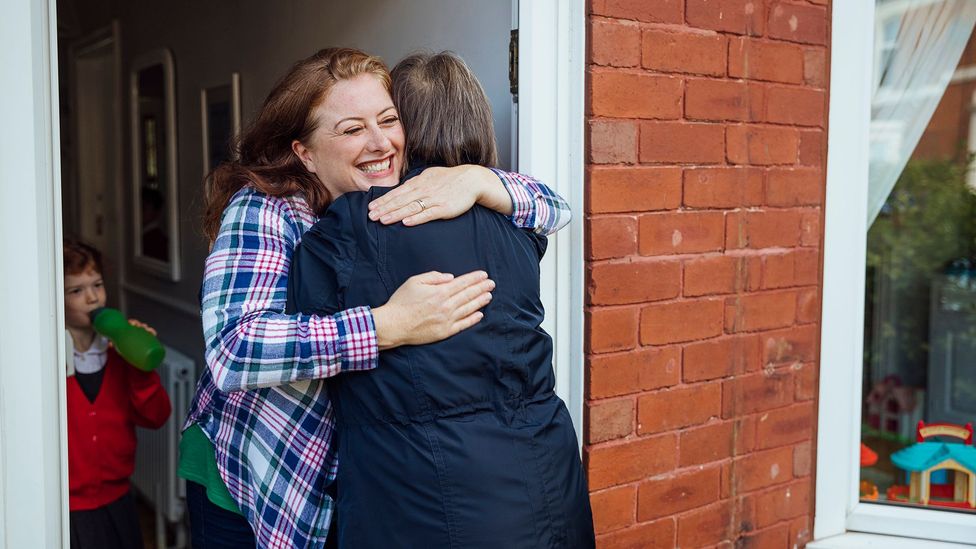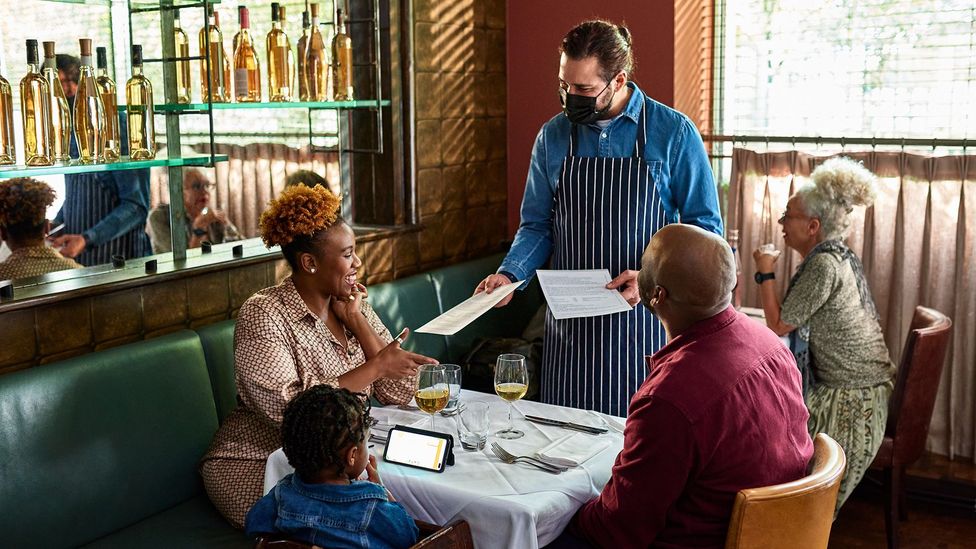When Will Life Be Back to Normal Again
Is going 'back to normal' fifty-fifty possible?

For some, things feel eerily normal – going out to the pub, seeing family unit and friends. Simply others may never feel settled again.
D
Despite how tenuous the land of the world remains, in some ways, life is starting to snap back into pre-pandemic normalcy in countries with high vaccine rates, like the United states of america and Uk.
Major sport events are reopening to capacity crowds, indoor restaurants are bustling, people are going on maskless dates and air travel has nearly rebounded to pre-pandemic levels. The best part? It'south all with the blessing of national wellness agencies (for vaccinated people, at least).
And even so, for many, the idea of getting on a packed plane to fly and visit elderly relatives for a holiday filled with hugs seems horrifying. It'south so far from what we've grown accustomed to over the last yr and a half. Even if y'all're vaccinated, it might feel near impossible to revert back to 'normal', as though nothing always happened.
Why is it, amidst a mostly re-opened earth, that some of united states still feel scared and hesitant to embrace the 'normal' lifestyle nosotros all craved equally we were shut upwards in our own homes for more than a year? Experts say that for against anxiety in general, some people opt for a more gradual arroyo, and that the post-pandemic historic period will exist no unlike. And even though some permanent social effects of Covid-xix are unclear, many people will get to that feeling of 'normal' – eventually.
The scars are existent
Fear and trepidation effectually returning to normal in the Covid-19 era is called 'mail-pandemic anxiety' or 're-entry anxiety'. Health-intendance practitioners effectually the earth take begun to address and treat the upshot. Office of confronting that anxiety means confronting the reality of what happened over the last 16 months.
As of this writing, nearly four one thousand thousand people across the world have died from Covid-19. For their loved ones, 'normal' might feel like it may never come. And many of those who haven't suffered traumatic losses are as well reeling, struggling with 'long-haul' Covid symptoms that endure for months. Additionally, more 100 meg people have lost jobs during the pandemic, another trying factor.
So, information technology's no surprise that many are finding the pandemic's effects are indelible. In the U.s.a., the Centers for Disease Control and Prevention found in December 2020 that 42% of Americans suffered from depression or anxiety – a huge increment from the xi% that was recorded prior to the pandemic. And many people are hesitant to stop preventative behaviours. A report from concluding week showed that 40% of Britons want to keep wearing masks in shops and on transport permanently, for example.
"Nosotros're never going to forget it. The human brain is kind of an additive organ – we add things to it, but nosotros don't subtract," says Kevin Larkin, professor of clinical psychology at West Virginia Academy, United states. "We're non going to forget that experience we went through, but nosotros can control our behaviours going forward,"despite the hardships we've collectively endured.

A adult female hugging her mum, who was part of her pandemic 'bubble'. Some of u.s.a. will be more hesitant to leave that bubble in coming months than others (Credit: Getty)
So, it tin can take effort to find the will and condolement to resume the simple pleasures of reading a volume in a café or embracing a friend – no thing how much you long for the hallmarks of life, circa 2019.
Dippers versus divers
Even so, although information technology'southward seemingly simple to attend an outdoor sporting consequence when health officials say it'south OK to practice so, some people seem to be having an easier time inbound the fray.
Larkin likens resuming a pre-pandemic lifestyle – or tackling anything that produces feet – to people who either dip their toe hesitantly into a cool puddle, or people who agree their jiff and dive right in. "Some people choose to ease into the water – and then other people prefer to go on a diving board and go far headfirst," he says.
In this mode, re-entry into post-Covid-19 club isn't different from overcoming whatsoever other anxiety-inducing situation. "Social phobia, ophidian phobia, OCD – they're all different types of feet disorders that are characterised by developing habits to try and minimise the anxiety," adds Larkin. "Usually, it's avoidance."
That's why he says almost of his patients have the 'dipping' approach. This process, called 'habituation' – getting used to something that addresses your anxiety – tin be both emotionally and physically uncomfortable, which is why people do information technology slowly, or don't do it at all. It'due south similar to cerebral-behaviour therapy (CBT), a common treatment for obsessive-compulsive disorder, which involves gradually exposing the patient feet triggers, to the point where they can live with them.
Of course, exposure isn't possible for loftier-take chances and unvaccinated people: "it's kind of similar diving into the deep end of the puddle and you don't know how to swim – there'south bodily danger there," says Larkin.
But for those who are vaccinated, risk tolerance is a factor. "Some people might bounce back and get to the stadiums and the football game games and then on – merely other people volition be more cautious," says Steven Taylor, professor and clinical psychologist at the University of British Columbia, Canada, and author of The Psychology of Pandemics.
Plus, says Taylor, 'going back' to normal tin can seem nebulous and unclear, especially as unlike countries are however at different stages of the pandemic, which can make even vaccinated people even more cautious.
"Pandemics are messy in how they cease, and the catastrophe is sort of arbitrary," says Taylor. "The WHO will announce one 24-hour interval that nosotros're entering a mail-pandemic menses, just what does that mean? The coronavirus is even so effectually, infecting and killing people, only the rates are low plenty that it'southward OK to open up the economic system."

Experts saying doing activities like dining indoors can have a while for people to get used to doing again (Credit: Getty)
Generalised anxiety, and the future
Anxiety aside, people are venturing back out – both dippers and defined.
A 29 June poll from market-inquiry firm Ipsos showed that ii-thirds of Americans hung out with friends and family, or went out to eat at a restaurant, while merely i-third of Americans did some form of social distancing during the same week. Does that mean the full general sense of fear and unease that's permeated society since Covid-xix'due south outbreak volition eventually disappear for good?
Taylor says that there will be some people who "volition never return to normal" – including those lost a loved one, or even lost a job, spousal relationship or home. However, Taylor believes that this group will be the minority; he says most people won't take any problem "somewhen" reverting to normal. He says that was especially the case with the 1918 Spanish flu – that it "was essentially forgotten", at to the lowest degree at a governmental or institutional level.
While countless individuals were traumatised, "there was very petty societal touch of the Spanish flu. It's really hard to find the psychological residue over the by century due to the Spanish flu," says Taylor. Even with more recent pandemics like H1N1, precautions similar face up masks "were rapidly abandoned" in Western countries.
For now, if you're feeling humble with re-entry anxiety, "break it down into steps with something that feels easier and do it, even though it feels scary", says Shari Steinman, assistant professor of psychology, and Larkin's colleague at Due west Virginia University. "Don't go to a crowded brawl game on twenty-four hour period i – start with playing catch with a friend."
Information technology's nonetheless too early to pinpoint Covid-19's society-wide psychological effects. For at present, the process is individualised.
"Everybody is on their ain journey, getting to the same place," says Larkin. "I think that people are going to take information technology at their own pace – and there'southward not a right or incorrect step."
Source: https://www.bbc.com/worklife/article/20210707-is-going-back-to-normal-even-possible
0 Response to "When Will Life Be Back to Normal Again"
Postar um comentário